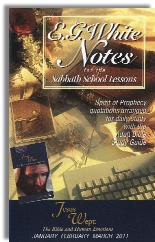|
||||||||||||||
Commentary on "Stress""
Day 4: Tuesday, January 11, 2011 - God's Therapy
Overview
Tuesday’s lesson makes the point that heaven provided guidance for Elijah to go through the steps “that would restore his normal mental health.” The author mentions “activity scheduling” as a common treatment for mood disorders and promotes “simple remedies” as means counteracting stress. It ends with questions about how consistent prayer might affect the quality of one’s life.
Observations
The lesson is entitled “God’s therapy” and makes the point that Moses’ activities when he ran from Jezebel and collapsed under a broom tree actually are the things often prescribed to combat “psychological stress”: sleep, eat, sleep again, followed by intense physical exercise: 40 days and night of running.
Elijah’s miraculous feedings provided by an angel and his 40-day trek to Mt. Horeb were not “simple remedies” designed to restore mental health. The real issue was Elijah’s faith and trust in God.
In fact, reducing the issue of Elijah’s suffering to mental health and stress reflects the Adventist view of humanity: a human is body-plus-breath (life-force). Adventists, in fact, consider humans to be physical beings that, when breathing, possess intangible mental and “spiritual” capacities. They do not believe, though, that humans possess spirits apart from the breath that animates their bodies.
This lack of understanding the spiritual reality of humanity is what leads to this “physical-izing” of the human experience. If we really are only bodies that breathe, then certainly Elijah’s problem was mental health and stress, both of which are founded in the physical body, especially the brain. The antidote to such problems would have to be behavior that modifies one’s thinking and stimulates the body’s functioning.
When we understand, however, that humans have immaterial spirits (see John 3:3-6; 4:24-25) in addition to physical bodies, Elijah’s suffering looks completely different. His problems were not primarily the result of cognitive distortion or intemperate living patterns. They were the result of lack of faith in God’s promises.
God’s provision for Elijah was not about providing him “simple remedies” of plain food, pure water, sleep, and exercise to regulate his body chemistry. Rather, God intervened to restore Elijah’s hope and to remind him that his despair was based on fear and not on truth. God provided food for a doubting prophet who indulged in self-pity instead of trusting God for his purpose as well as his provision.
Elijah’s problems could be resolved only by his surrendering his self-pity, his fear, and his fatigue to Yaweh and believing that He would protect him.
Prayer is not an antidote to stress. Prayer is the way a true Christ-follower lives. Prayer is submitting to the Father’s will and surrendering one’s dreams, desires, and rights to God and allowing Him to have His way. Prayer is how we let go of our self-protection and allow God to do what He knows needs to be done, believing that He will care for us better than we can care for ourselves—even if such trust means losing something we don’t want to lose.
Conclusion
- God’s therapy is not about addressing physical needs. His “therapy” is spiritual, leading us to a place of surrender and trust.
- Elijah was not receiving divinely-directed diet and lifestyle instructions. Rather, he experienced God’s miraculous intervention for the purpose of being reminded that God was with him and was caring for him.
- Humans are not merely physical bodies with breath. We also have immaterial spirits, and it is our spirits that can know God.
- Elijah received spiritual nurture from God; affirmation that He was in charge and was providing for him.
- Prayer is important not because it focuses and distracts our minds but because in prayer, we are speaking directly to God, mediated by the Holy Spirit (Romans 8:26-28).
- When we surrender our rights, desires, and dreams to God, He communicates with us through His word to our spirits, and we receive His strength. These things are real and happen in our spirits.
- Elijah overcame his discouragement by submitting to God, not by eating, resting, and exercising.
- Flesh gives birth to flesh; Spirit gives birth to spirit (John 3:6).
Copyright 2011 BibleStudiesForAdventists.com. All rights reserved. Revised January 10, 2011. This website is published by Life Assurance Ministries, Glendale, Arizona, USA, the publisher of Proclamation! Magazine. Contact email: BibleStudiesForAdventists@gmail.com.
The Sabbath School Bible Study Guide and the corresponding E.G. White Notes are published by Pacific Press Publishing Association, which is owned and operated by the Seventh-day Adventist church. The current quarter's editions are pictured above.
Official Adventist Resources
Standard Edition Study Guide Week 3
Teacher's Edition Study Guide Week 3


